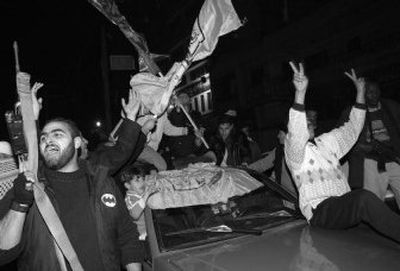Fatah, Hamas agree to form government

JERUSALEM – Rival Palestinian factions Fatah and Hamas agreed Thursday to form a power-sharing government and end the armed feuding that has killed scores of Palestinians over the past year.
It remained unclear whether the new government will meet conditions laid down by Israel and international donors to fully restore funding to the Palestinian Authority that they cut off after Hamas’s victory in January 2006 parliamentary elections.
The agreement does not explicitly recognize Israel’s right to exist, a key international demand. Hamas officials said their movement would not do so.
The new Cabinet will set aside seats for Fatah – it currently has none – and some smaller parties, but it will continue to be led by Prime Minister Ismail Haniyeh of Hamas.
In assigning Haniyeh the task of forming a new government, Palestinian Authority President Mahmoud Abbas, a Fatah leader, stated that its platform must conform with “international resolutions” and “respect” previous agreements signed with Israel.
The wording amounted to a compromise acceptable to Hamas, formally known as the Islamic Resistance Movement, which refuses to openly endorse the 1993 Oslo accords and other agreements that the Fatah-dominated Palestine Liberation Organization negotiated with the Jewish state.
The deal “brings us to the shores of peace,” Abbas said in the holy city of Mecca, Saudi Arabia, where the factions have been meeting.
“This initiative has been crowned with success.”
Dubbed the Mecca Accord, the agreement emerged after two days of negotiations under the auspices of King Abdullah, a Sunni Muslim who is concerned about Shiite-dominated Iran’s growing influence within the Palestinian territories through the money it has provided Hamas during the aid embargo.
Palestinian officials used the deal to appeal for an end to the partisan violence in the West Bank and Gaza Strip that has killed about 70 Palestinians since December, when Abbas threatened to call early general elections unless Hamas agreed to share power.
The disunity has undermined the Palestinian national movement as Abbas is preparing to meet Feb. 19 with Israeli Prime Minister Ehud Olmert and U.S. Secretary of State Condoleezza Rice to discuss ways of reviving the Palestinian-Israeli peace process.
Palestinian leaders said that the agreement, which gives Haniyeh five weeks to form a government, would begin closing those rifts.
“We will rebuild our Palestinian house on strong foundations,” said Khaled Mashaal, exiled leader of Hamas’ political wing, who took part in the talks. “This agreement will be fully committed to before God.”
After Hamas ended Fatah’s long monopoly on political power last year, it invited Fatah to join its Cabinet, but the secular-nationalist party declined.
Since then, party leaders have twice announced the formation of a national unity government, only to see the agreements collapse soon after.
The United States, the European Union, Russia and the United Nations – the group of Middle East peace mediators known as the Quartet – have demanded that Hamas recognize Israel, renounce violence and abide by previous agreements in return for resumption of aid that accounts for nearly half of the Palestinian Authority’s operating budget.